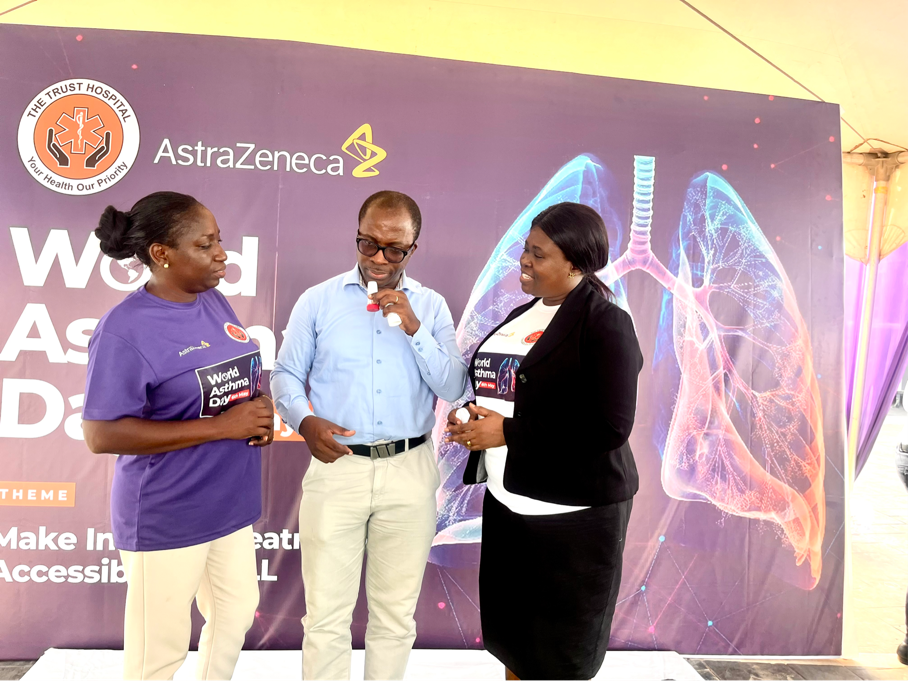Trust Specialist Hospital, AstraZeneca push asthma breakthrough with symbicort access
By Sandra Agyeiwaa OTOO
Trust Specialists Hospital, in partnership with AstraZeneca, has marked World Asthma Day 2025 with a renewed commitment to asthma care.
Under the theme ‘Make inhaled treatment accessible to all’, the event highlighted the critical role of symbicort, a combination of formoterol and budesonide which is now covered under Ghana’s National Health Insurance Scheme (NHIS).
Also, this year’s global theme is especially relevant in Ghana, where access to inhalers remains a challenge. The World Health Organisation reports over 455,000 annual asthma deaths, mostly in low- and middle-income countries, including Ghana.
Speaking at the event, Dr. Juliana Oye Ameh, Chief Executive Officer (CEO) of Trust Specialists Hospital, mentioned that the shift from salbutamol to symbicort represents a significant breakthrough in asthma treatment, offering more effective management and improved outcomes for patients nationwide.
“I think some of the most significant breakthroughs are the role of symbicort in the treatment of asthma, which is formoterol budesonide. In years past, more emphasis was placed on the salbutamol inhaler but from today’s education, we have seen that that is on the decline; and rather symbicort, which is the combined product is coming on board very strongly. So I think that is a breakthrough in the treatment,” she stated.
Dr. Ameh said the greatest challenge in asthma care is the stigma and myths surrounding the condition, adding that with proper public education from health professionals, treatment outcomes will improve; and patients can lead normal, well-managed lives.
“I think the greatest challenge would be stigma, and you know the myths surrounding asthma. I think that is the greatest barrier. And once we are able to educate our people and get rid of the stigma, we will see that the treatment of asthma will improve and the survival of people with asthma will also improve,” she stressed.
“There is much more public education and I know that our public health personnel – our doctors, nurses, community health nurses – will carry the message that asthma is not fatal. You know, whenever the disease comes up, people look at it like a death sentence but it is not a death sentence. It’s a disease that can be well-managed. And we have learned that when it is well-managed, survival improves and the individual lives a normal life,” she added.
She shared that “as a client-centred healthcare-service provider dedicated to achieving excellence, we acknowledge the critical significance of ensuring that asthma care, particularly inhaled treatments, are available, affordable and accessible to all individuals”.
As part of the efforts to ensure proper asthma care, her outfit operates a specialised asthma clinic in three of their clinics in Adenta, Dome and Dansoman. At the asthma clinics, clients diagnosed with asthma receive tailored care, comprehensive education and guidance to manage their condition effectively.
In her view, collective efforts from families, communities and healthcare systems are crucial to eliminating asthma stigma, misinformation and barriers to treatment, making accessible inhaled treatments a tangible goal.
Dr. Ameh called for broader policy change, saying: “It is imperative for us as a nation healthcare providers and, indeed, it should be a matter of policy to ensure a consistent supply and equitable pricing of inhalers. We need to prioritise asthma care within non-communicable disease strategies and advocate for clean air initiatives”.
“Together, we commit to ensuring that everyone in Ghana can access proper asthma treatment. As we gather today, we must reflect on our shared responsibility in combating this silence epidemic. Healthcare professionals must persist in their efforts to educate and empower patients effectively,” she concluded.
A medical representative from AstraZeneca, Dorothy Leticia Arthur, outlined AstraZeneca’s long-term commitment to respiratory health and its role in improving asthma treatment access in Ghana.
“Over the years, AstraZeneca has always been a pioneer in the asthma space. So for some years now, we’ve been partnering with facilities on occasions like this and we’ve been also having training sessions for our prescribers, nurses, staff and staffs of hospitals to be able to get to a zero mortality for asthma,” she revealed.
Ms. Arthur mentioned: “We want to get to a place whereby we are not going to have any mortality for our asthma patients. And with this, what do we benefit from it if we do all this and our drug is not accessible to our patients who for no fault of theirs are asthmatic?
“So one of the main projects we did was the PUMUA project. And in this project, we were able to put our symbicort on health insurance so that patients even in the remote areas can also have access to it if they have the national health insurance”.
According to the AstraZeneca representative, her outfit has supported hospitals like Trust Specialists Hospital with nebulisation stations to reduce emergency asthma cases.
“We were able to set up nebulisation stations for hospitals, with Trust Hospital being a beneficiary; so that we’ll be able to help these patients reduce the asthma exacerbations,” she revealed.
The post Trust Specialist Hospital, AstraZeneca push asthma breakthrough with symbicort access appeared first on The Business & Financial Times.

